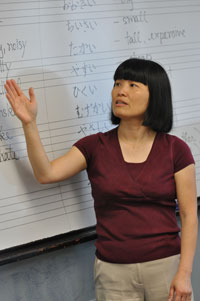"I have been teaching the Japanese language for more than 10 years. My Berklee students are all really interested in Japanese culture and language. I think most of them want to go to Japan. And another thing is they have Japanese friends here, and they want to be able to communicate to their friends. Every semester I have at least two or three students who have boyfriends or girlfriends who are Japanese. That's the reason they come to the class. They will study for one semester, and then when they have a vacation they will go to Japan and see their girlfriends' and boyfriends' parents. I think it's a good incentive to learn a language!"
"Berklee is unique in having a large population of Japanese students compared to other universities. A student can just step outside of their room and see Japanese people, and start to use the language. Also, everyone here is a musician, so they already have something in common. They can talk right away. At other universities it's harder for students to find friends or a practice partner."
"I think language is a tool for students to discover the world around themselves or even a world within themselves. Without language I think the world is limited. Many of my students, I think, never really looked into the English language before. But because they learn another language they can actually know English much better. And by knowing English compared to Japanese, they learn to know themselves."
"I hope that students recognize differences, but look at the similarities more than the differences. Because when we look at each other, if we always say, 'You are different than me,' then we cannot really go that far. But if we look at a person and we say, 'You are the same as me,' then we can find a lot of other things in common and we can find things to talk about."

